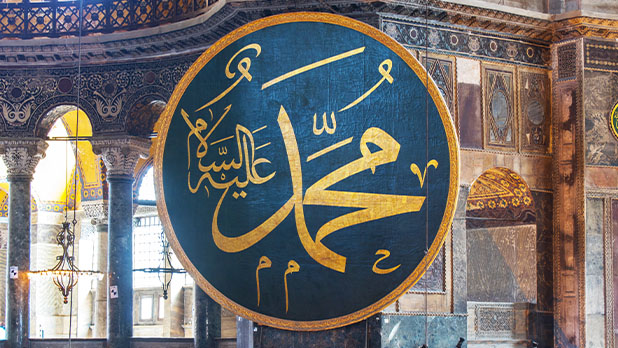Why Can’t Mirza Ghulam Ahmad Be a Prophet?
Answered by Shaykh Abdul-Rahim Reasat
Question
According to Khatam al Nabiyyin, why can’t Mirza Ghulam Ahmad be a prophet?
Answer
I pray you are well.
Evidence From the Quran
The term Khatam al Nabiyyin is taken from the verse “Muhammad is not the father [through adoption] of any of your men; rather, he is the Messenger of Allah and the Seal of the Prophets.” (Qur’an,33:10) The elite and expert scholars of the Arabic Language and of the Science of Tafsir have all unequivocally stated that this verse means that there can be no more people who receive revelation – Prophets or Messengers – from God after the Prophet Muhammad.
Stating that Mirza Ghulam Ahmad is prophet would render the meaning of the words of the Qur’an to be incorrect, which they cannot be, as they are from Allah. Supporting his claim to being a prophet is, then, in opposition to the Qur’an.
The Imagery in the Verse
A khatam is a seal which is used to sign a letter after writing it. The letter was folded and hot wax was placed on it to seal it shut. Then, the writer would place a seal, which had his signet on it, to leave an impression on it.
The purpose of the wax seal was to prevent the letter being opened, and to to prevent any alteration to its contents. This, therefore, would be the final step in the process. This is the description used to describe the Prophet Muhammad – the last in the line of Prophets and Messengers sent by Allah (Allah bless them all and grant them all peace).
The verse also has another canonical recitation with the word ‘khatim’ replacing ‘khatam’ in reference to the Prophet Muhammad (Allah bless him and give him peace). This has the meaning of him actually sealing the line of Prophets himself, and thereby further supporting the meaning of the other recitation.
To say that there was another prophet or messenger would then completely undermine and contradict the meaning of this verse from both aspects. This is sufficient proof for this matter.
Further Proofs
Not only that, but the fact that the entire umma since the time of the Prophet Muhammad (Allah bless him and give him peace) has affirmed – scholars and laymen alike – that there can be no more prophets. So if someone was to make this claim – and there are those who have – they would have to provide an alternative explanation of the verse and disprove the arguments of the scholars of the entire umma.
No one has done this.
What’s more is that there are many, many hadith narrations from the Prophet Muhammad (Allah bless him and give him peace) himself clearly state that there is no prophet after him. So many have been narrated from him that they have reached the level of Mass Transmission (Tawatur). This gives us absolute certainty of him having said them.
An example is the hadith, “Banu Isra’il were led by Prophets: every time a Prophet died he was replaced by another Prophet. Truly, there is no Prophet after me!“ (Muslim)
Based on these, and many more proofs, there cannot be another Prophet after the Prophet Muhammad (Allah bless him and give him peace). Those who make the claim are disbelievers according to the standards of Islam, and they are denying the Qur’an and the Mass Transmitted Sunna.
Mirza Ghulam Ahmad also had other statements which would be considered statements of kufr. Scholars have refuted his claims and statements in many works.
(Alusi, Ruh al Ma’ani, Fawdeh, al Sharh al Kabir ‘ala al ‘Aqida al Tahawiyya)
Accepting the Truth – No Matter What
It may be that someone has grown up in a family who believes that he was a Prophet. This is a test from Allah, and their response is not unlike the response required of the Companions. They had to accept that the allegiance of every belief – first and foremost – is to Allah. This entails accepting what He has ordained, and in this situation, it is to accept that the Prophet Muhammad was the final and greatest Prophet, and that every claim to anyone being a Prophet after him is a false one.
This may entail having difficulties with the family or relatives, but that is far better than turning up on the Day of Judgement and being amongst the disbelievers. We are commanded to believe in Islam on Allah’s terms, not ours. He makes the rules. We – as slaves – accept them. No one is worth going to Hell forever for!
We ask Allah to show us the truth as being the truth, with the ability to follow it; and for us to see what is wrong as being wrong, and to have the strength to shun it.
May Allah grant you the best of both worlds.
[Shaykh] Abdul-Rahim Reasat
Checked and Approved by Shaykh Faraz Rabbani
Shaykh Abdul-Rahim Reasat began his studies in Arabic Grammar and Morphology in 2005. After graduating with a degree in English and History, he moved to Damascus in 2007, where, for 18 months, he studied with many erudite scholars. In late 2008 he moved to Amman, Jordan, where he continued his studies for the next six years in Sacred Law (fiqh), legal theory (Usul al-fiqh), theology, hadith methodology, hadith commentary, and Logic. He was also given licenses of mastery in the science of Quranic recital. He was able to study an extensive curriculum of Quranic sciences, tafsir, Arabic grammar, and Arabic eloquence.
